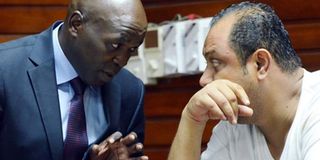Premium
Akasha sons to remain in cells, now court rules

Lawyer Cliff Ombeta (left) with Baktash Akasha Abdalla at the Mombasa Law Courts after the ruling on November 13, 2014. The Akashas on December 19, 2014 failed to have an appeal by the Director of Public Prosecutions against their release on bond struck out. PHOTO | KEVIN ODIT |
What you need to know:
- Assistant Director of Public Prosecutions Alexander Muteti wanted the suspects remanded for 21 days.
- But the court said they should instead be held for 17 days considering they had already been in cells for three days.
Sons of slain drug baron Ibrahim Akasha will remain in police custody for 17 days as the State prepares to formally extradite them.
The Akashas together two other suspects are wanted by a US court to face narcotic-related charges.
Mombasa chief magistrate Maxwell Gicheru issued the provisional warrant of arrest against the four after an application by the state.
Assistant Director of Public Prosecutions Alexander Muteti wanted the suspects remanded for 21 days.
But the court said they should instead be held for 17 days considering they had already been in cells for three days.
The magistrate declined to issue an order barring Interior Cabinet Secretary Joseph Ole Lenku from extraditing the suspects without a court order.
Defence lawyers Cliff Ombeta and Gikandi Ngibuini were unhappy that one of the suspects was moved to Nairobi without the knowledge of the court.
“This situation is too delicate and we want the court to be firm. How did the suspect leave a police cell without an order?” Mr Ngibuini lamented.
Mr Ombeta wants the suspects to be accompanied by their lawyers during any interrogation.
MOVED TO NAIROBI
Mr Muteti said the DPP was committed to ensure the law is followed. “We were not informed that a suspect was moved to Nairobi for interrogation,” Mr Muteti said.
“We will issue necessary directives to the investigators thus, there is no reason to issue an order against the Cabinet Secretaries,” he added.
On Monday, the court was told the US District court in Southern District of New York had issued warrants of arrest against the suspects, Mr Baktash Akasha Abdalla, Vijaygiri Anandgiri, Ibrahim Akasha Abdalla and Gulam Hussein, to face charges of conspiracy to import narcotics.
And on Thursday, Mr Gicheru noted the country had a duty to co-operate with international law and that there is no conflict between Kenya and her laws.
He said the documents the prosecution presented to court in support of the application were in order.
“It is too early to decide whether they (respondents) have been to the US or not,” said the magistrate.
However, Mr Ombeta said the warrants attached to the application do not have a date meaning they were not issued, hence have not effect on the jurisdiction of the court.
Mr Muteti said the DPP is satisfied that there is sufficient ground to seek provisional warrants pending the receipt of original warrants from the US government as required by law.





